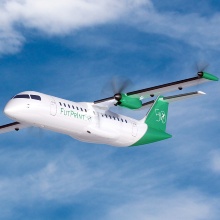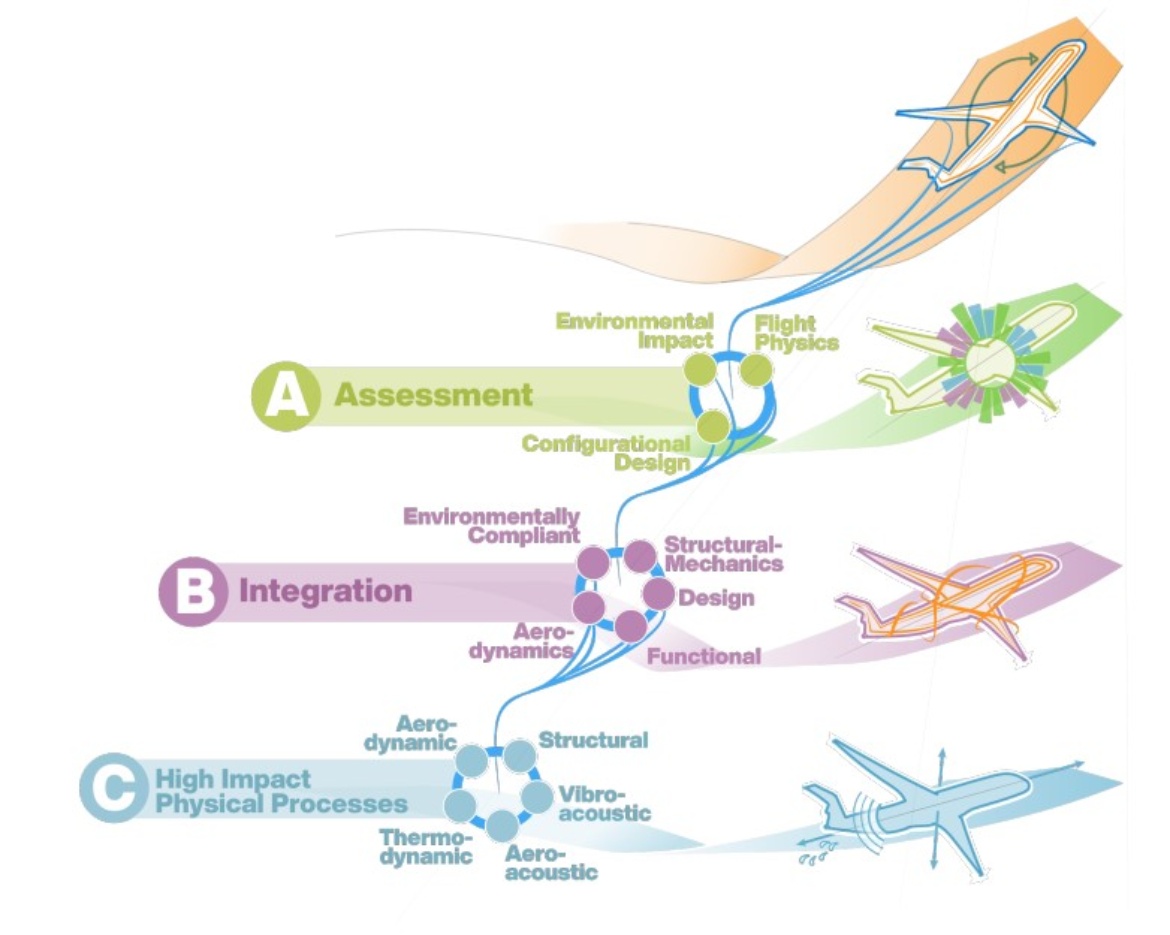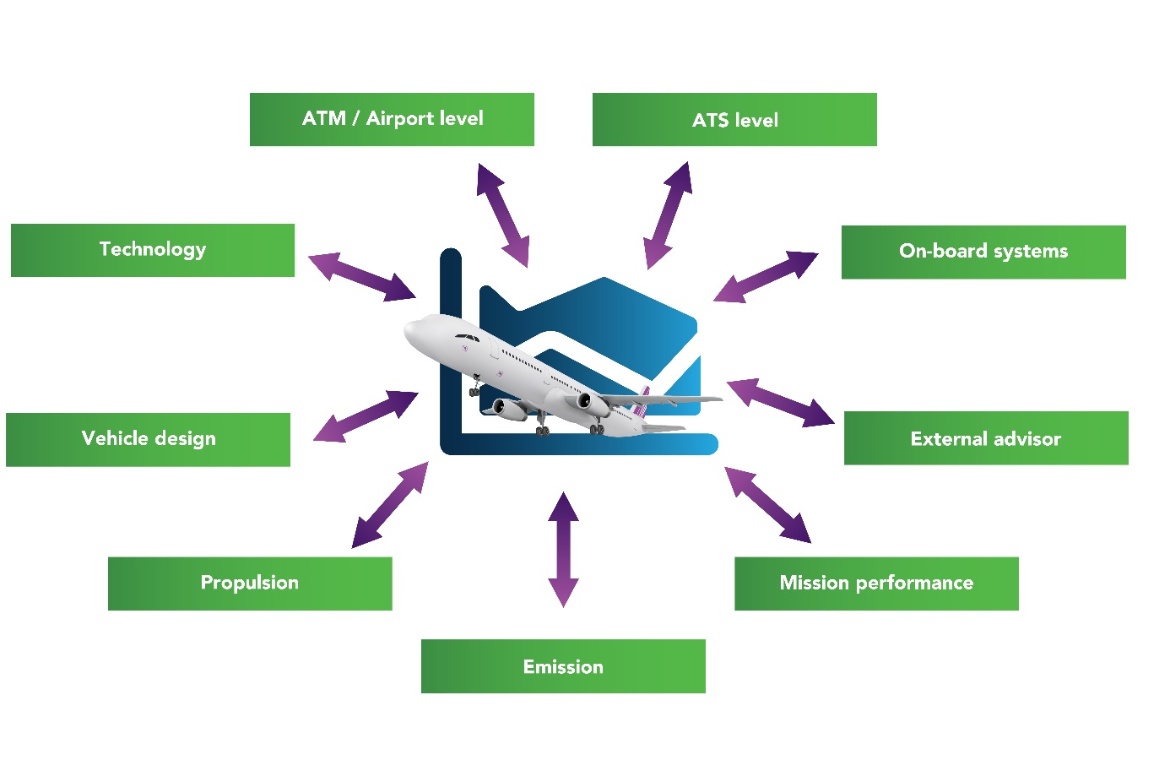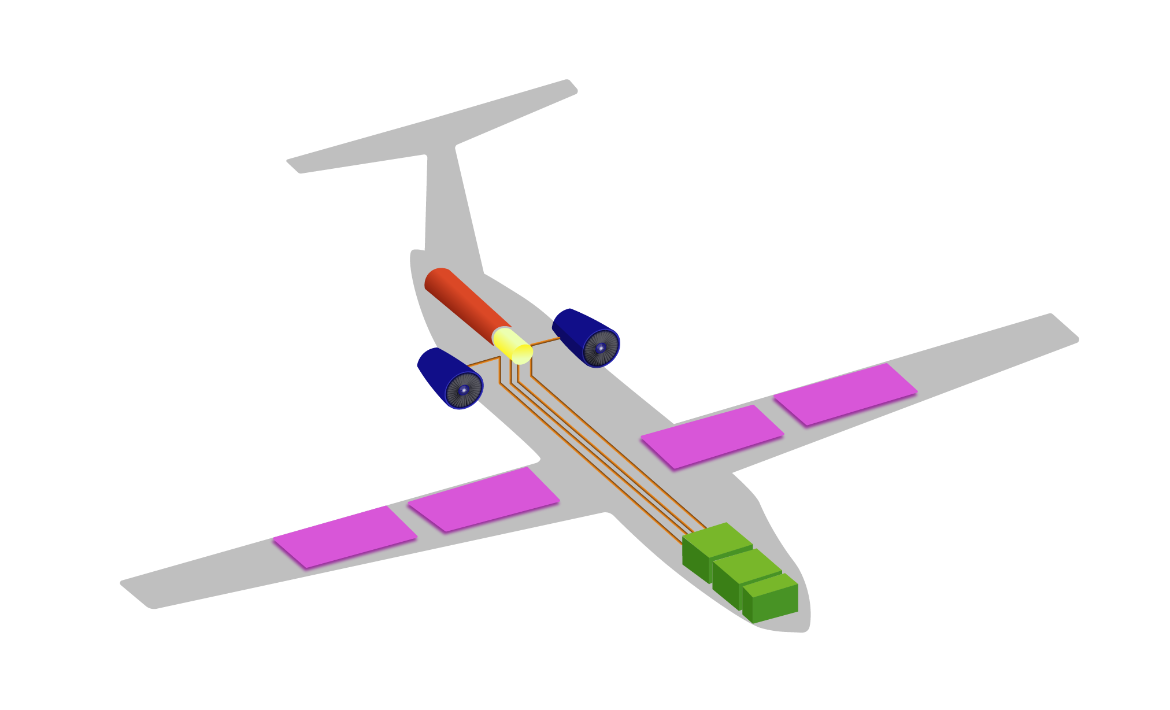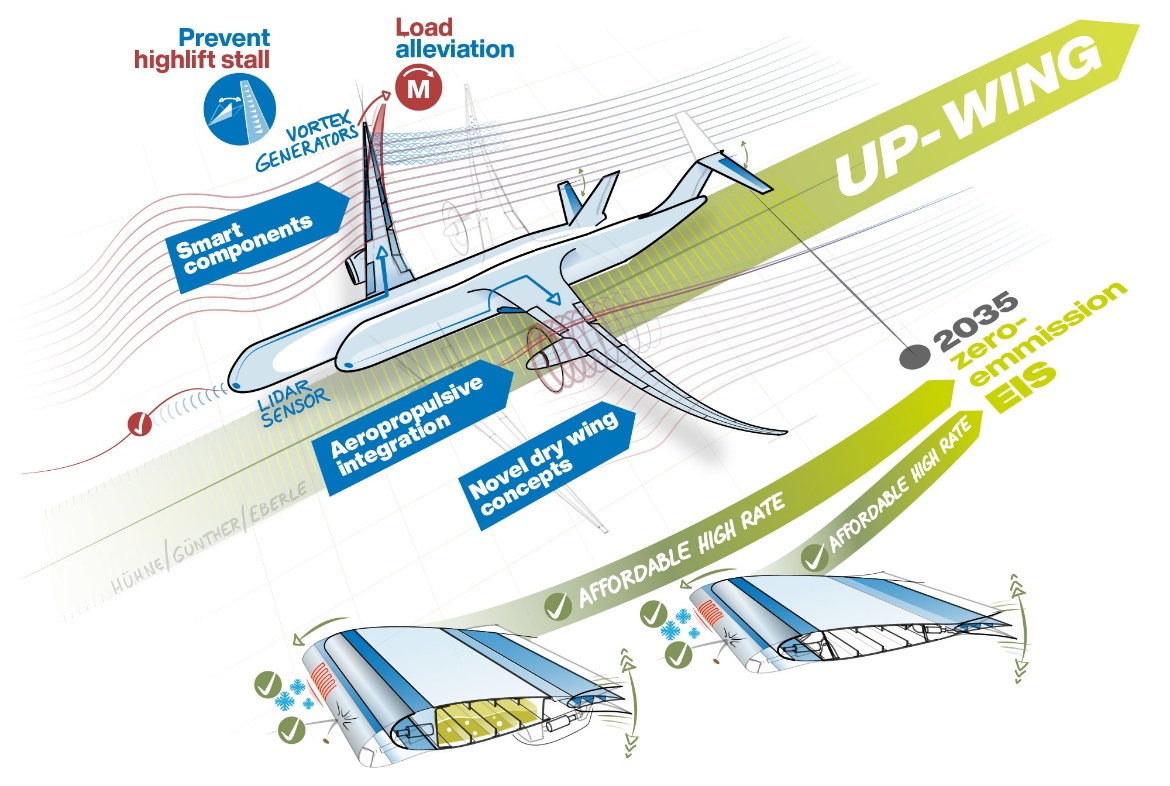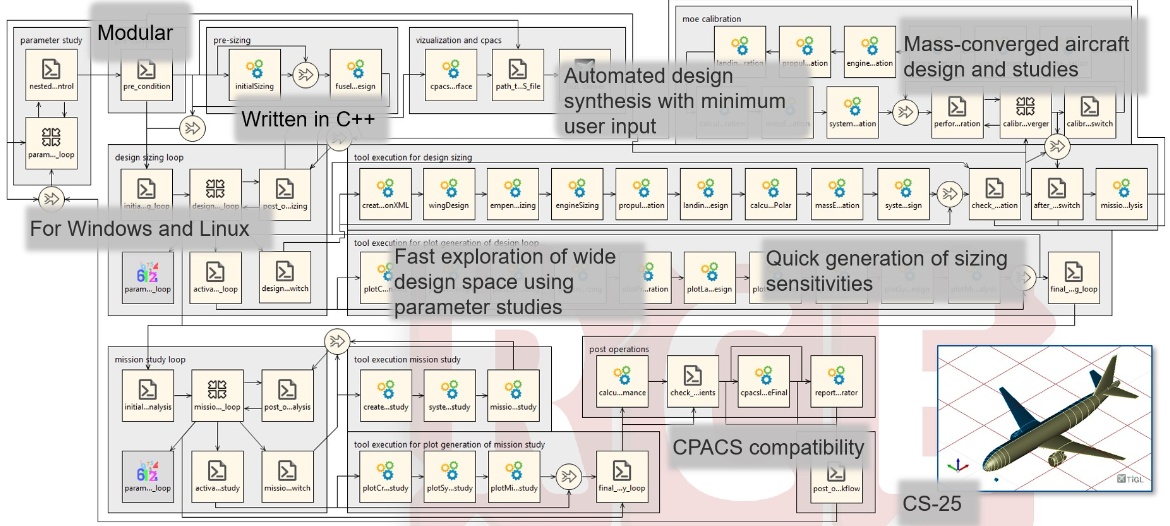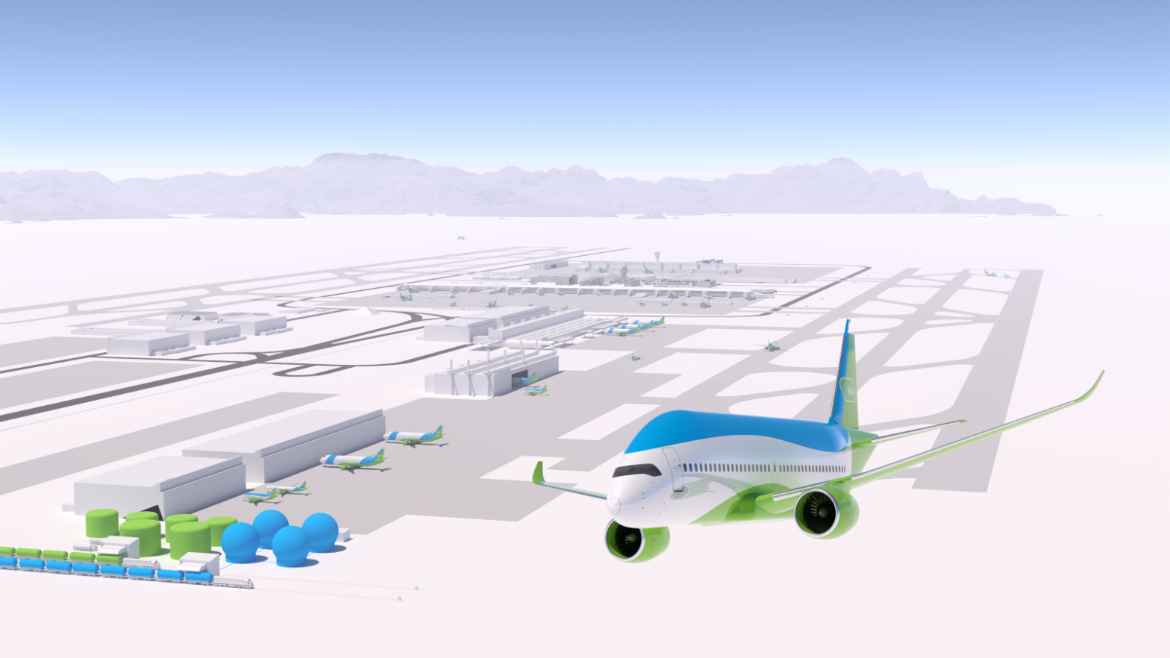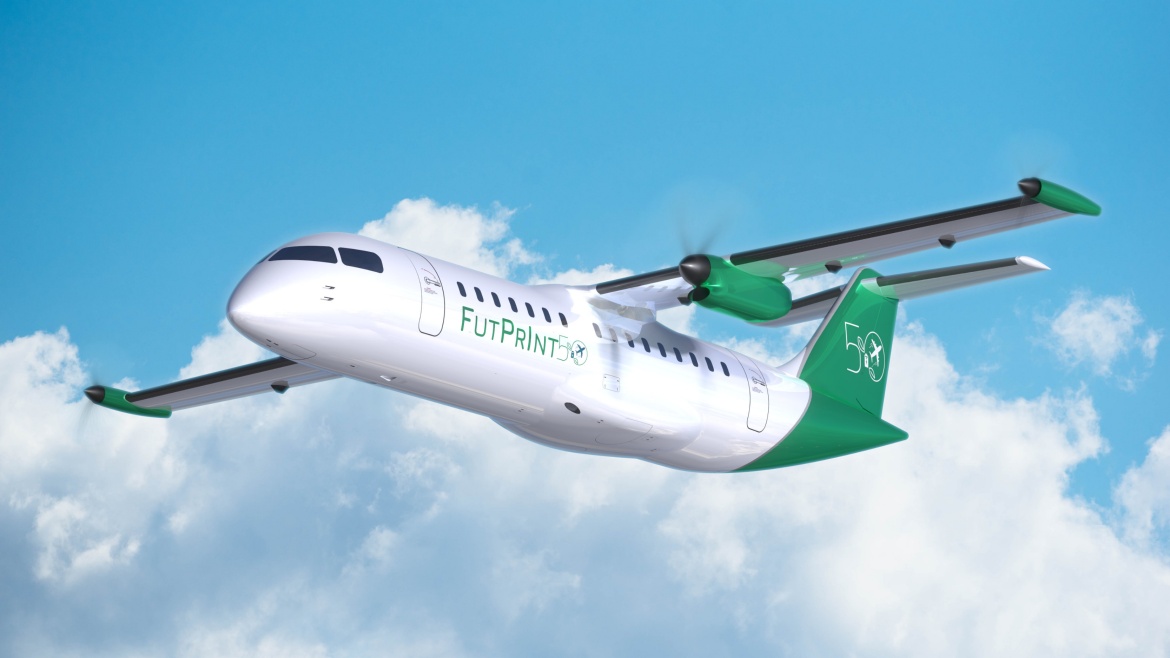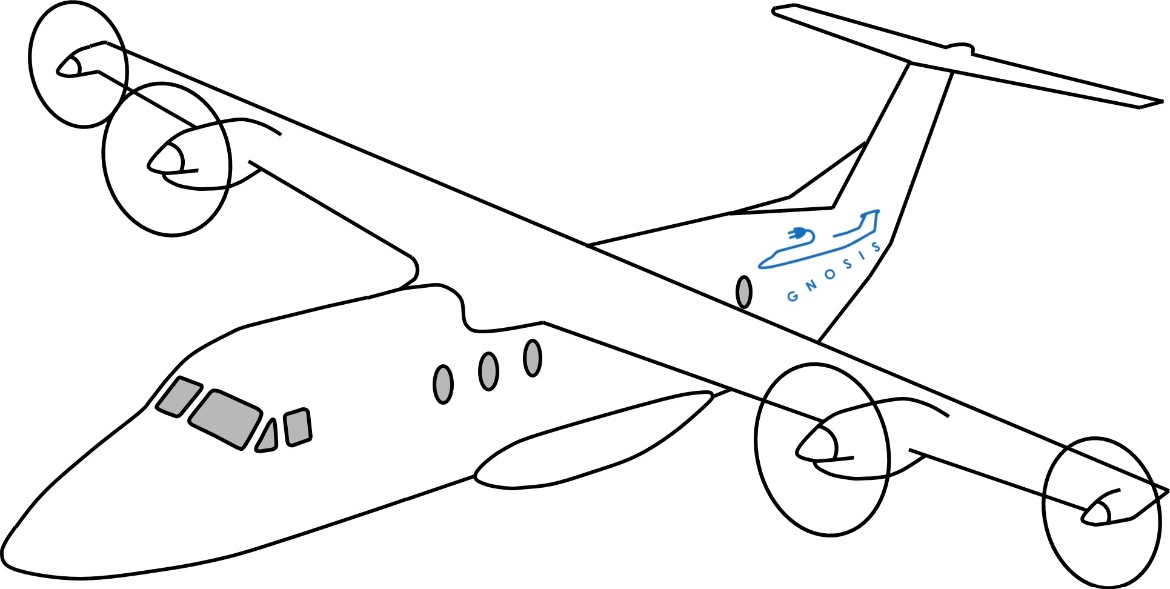The teaching in the field of general and conceptual aircraft design deals with the description of the basic procedures of classic aircraft design (handbook methods) and its critical reflection as well as the necessity of the used methods. In the context of the ‘Aircraft Design Seminar’, the students are regularly given the opportunity to perform an entire aircraft design process by doing group work. The relating scenarios and boundary values are defined in collaboration with the ‘Future Project Office’ of Airbus Industries.
The field of research mainly focuses on the improvement of the statistical preliminary draft tools introduced above and for the development of new design approaches. The emphasis is on analytic methods.
Current Projects
UniSELECT
Selective-integrated investigation of radically unconventional aircraft configurations and technologies in terms of their potential to increase efficiency, taking into account regulatory and operational restrictions
Content of the project
UniSELECT is a follow-up and parallel project to UNICADO and UNICADO-II.
The aim of UniSELECT is to systematically investigate which efficiency increases are possible with new technology options and radical unconventionel aircraft configurations are possible by 2050. In addition regulatory and operational constraints will be investigated that prevent the full utilization of the potential of these new technologies and configurations, both currently and projected for the future. The reduction of the savings potential due to regulatory restrictions is to be quantified in the project, in order to provide the authorities with a new perspective. At the same time the extent to which specific relaxation of certification requirements or operational constraints can serve the overarching goal of reducing climate impact.
Contribution of the IFB
Identification of regulatory boundary conditions that have a direct and indirect impact on aircraft design with new technologies and disruptive configurations at the preliminary design level.
Development of design methods, technology and system models for the design space developed from the requirements design space for a maximally efficient long-haul aircraft.
Conducting a comprehensive technology and configuration screening with regard to radically unconventional aircraft configurations with experts from the industry and the literature.
Derivation of a possible design space from the screening for a radically unconventional long-haul aircraft configuration with minimal climate impact.
Specification of a transparent evaluation and decision-making process for the configuration of a radically disruptive long-haul aircraft, as well as the development of an algorithm for the repetitive execution of the same configurative decision processes.
Iterative designs of various radically unconventional long-haul aircraft based on the configurations and technology configurations and technology combinations determined by the decision processes. Students are also involved via design competitions to increase the number of designs and creativity.
Conducting sensitivity studies with UNICADO to assess the potential of the aircraft designs in terms of the potential of emissions and life cycle costs.
Project partners
- RWTH Aachen
- TU Munich
- TU Berlin
- TU Braunschweig
- TU Hamburg
Funding
Federal Ministry for Economic Affairs and Climate Action (German aviation research program LuFo VI-2)
Duration
January 2024-December 2026
Contacts
SynTrac
Synergies of Highly Integrated Transport Aircraft
Project description
To enable climate-neutral aviation in the future, the energy consumption of aircrafts must be significantly reduced. The continuous further development of aircraft and propulsion technologies and the increased integration of these promise considerable energy savings.
The Collaborative Research Centre SynTrac concentrates on highly integrated commercial aircrafts and focuses on principles such as boundary layer ingestion and distributed propulsion. SynTrac explores cross-disciplinary synergies and investigates optimal integration methods and models for comprehensive, configuration-independent research to enable energy savings, aerodynamic improvements and acoustic requirements.
Project partners
- University of Stuttgart
- Technische Universität Braunschweig
- German Aerospace Center (DLR)
- Leibniz University Hanover
Funding
Deutsche Forschungsgemeinschaft, DFG Programm CRC/Transregios
Duration
2023 – 2026
Contact
Impact Monitor
Assessing European aviation research and innovation impact
Project description
Impact Monitor is an EU-funded project implemented by a highly competent and complementary consortium.
Its first high-level aim is to develop a coherent and holistic impact assessment framework and toolbox that supports the European Commission (EC) in making science-based informed decisions for technology and policy assessment of the environmental, economic, and societal impact of European aviation R&I. Specifically, the assessments will focus on greenhouse-gas emissions, local air-quality, and noise. The project focuses on demonstrating the collaborative assessment through example use cases at aircraft, airport, and air transport system level.
The underlying system of systems architecting process will be supported by digital technologies for collaborative engineering, under the project coordination of the German Aerospace Center (DLR).
Impact Monitor builds on and advances the approaches used in EC Better Regulation guidelines and toolbox as well as in the EC projects TEAM_Play, Clean Sky TE, and AGILE/AGILE 4.0.
Contribution of the IFB
The Institute of Aircraft Design supports the Impact Monitor project at the aircraft design level. For this purpose, various reference aircraft are replicated in the design environment SUAVE together with project partners. The models serve as a basis for evaluating new technologies in the example use cases. An important component for this is the integration of the exchange format CPACS developed by DLR into SUAVE, as well as the integration of SUAVE into the Remote Component Environment (RCE).
Project partners
For a full list of project partners see CORDIS Project page.
Funding
European Commission (Horizon Europe), Grant Agreement ID: 101097011
Duration
February 2023 – January 2025
Contact
Acknowledgement
Funded by the European Union, under Grant Agreement No. 101097011. Views and opinions expressed are however those of the author(s) only and do not necessarily reflect those of the European Union or CINEA. Neither the European Union nor the granting authority can be held responsible for them.
CONCERTO
Construction Of Novel CERTification methOds and means of compliance for disruptive technologies
Project description
CONCERTO is an EU-funded project, under the Clean Aviation Joint Undertaking programme. The project’s overall objective is to develop technical data which will constitute draft regulatory material for future breakthrough innovations.
Clean Aviation’s ambition to go over decisive impactful steps in demonstrated disruptive aircraft performance compatible with 2035 EIS will only be possible if the future regulatory framework is not an impediment to innovation. Certification shall still improve safety while shortening time to bring new safe products to market and into service, and maintaining European leadership and competitiveness. Having de-risked the certification path is therefore an important step. The project will deliver a comprehensive set of regulatory materials on certification together with preliminary description of methods of compliance applicable to the three "thrusts" of Clean Aviation and a first status of comprehensive digital framework of formalized collaborative tooled and model/simulation-based processes for certification.
The composition of the project consortium reflects a smart mix of aircraft manufacturers (CS-25, CS-23), engine manufacturers (CS-E), equipment manufacturers, research centers, universities, SME and PLM experts.
Contribution of the IFB
Within CONCERTO three major technology enablers are investigated. The focus lies on the usage of H2, an active wing and an electrified distribution and propulsion architecture (in short high voltage distribution – or HvD).
The institute of aircraft design is active within the HvD Proof of Concept (POC). Together with the consortium and the EASA, we aid in defining and organizing the PoCs for new principles and certification processes including the expected results and metrics and to define the targeted safety objectives and the operational environment (CONOPS) to develop applicable regulations and boundaries for the project. The Institute of Aircraft Design leads the certification and gap analysis processes, where results regarding the defined architecture are assessed given the current regulatory body (CS-23, SC-E19, CS-25, CS-E), where gaps shall be identified.
Further activities within CONCERTO will develop suggestions on how to fill these identified gaps, including the investigation of the use of simulation as means of compliance (MOC) for certification.
Project partners
For a full list of project partners see CORDIS Project page.
Funding
European Commission (Horizon Europe, JU Clean Aviation), Grant Agreement ID: 101101999
Duration
January 2023 – December 2026
Contact
Acknowledgement
The project CONCERTO (GA ID: 101101999) is supported by the Clean Aviation Joint Undertaking and its members.
UP Wing
Ultra Performance Wing
Description of the project
The Ultra Performance Wing project will validate, down select, mature and demonstrate key technologies and provide the architectural integration of “ultra-performance wing” concepts for targeted ultra-efficient Short/Medium Range aircraft (SMR), i.e. 150-250 PAX and 1000-2000 NM range.
The project directly addresses the Clean Aviation objectives: fuel burn reduction of minimum 30% aircraft level, compared to the state-of-the-art reference Aircraft. UP Wing will consider 2 aircraft configurations, covering both exploitation horizons outlined in Clean Aviation impact objectives: a high aspect ratio SAF wing with turbofan engine targeting 10-13% and a dry high aspect ratio wing with open rotor up to 17% energy efficiency efficiency increase on wing level. The dry-wing concept will utilize an alternative energy source which will be located in a rear fuselage tank.
UP Wing will develop the integrated high aspect ratio SAF wing up to TRL4 until the end of this project and will provide concepts studies for several dry wing configurations. The interdisciplinary European consortium, consisting of airframe integrators, industry, research establishments and academia will develop the related enabling technologies covering all relevant engineering disciplines. Ground, wind tunnel and virtual testing are foreseen. Thanks to multidisciplinary optimisation the overall wing design for Configuration 1 will ensure the proper integration of all technologies up to TRL4. These results will be picked up in a second Clean Aviation phase achieving TRL6 until the end of the Clean Aviation programme.
These Clean Aviation objectives are well aligned to the development plans of future aircrafts entering into service in 2035 (SAF SMR & H2 Regional), with 75% market penetration until 2050. Academia involved will ensure proper scientific exploitations via lectures, conference contributions, journal proceedings whereas the industrial partners will mature specific technology bricks to TRL4 and higher.
Contribution of the IFB
The Institute of Aircraft Design will focus on the structural design and evaluation of the strut of the dry wing concept. By fully parametrized finite-element models Design of Experiments are performed. This allows to identify the main design parameters and a detailed model with given boundary conditions can be generated.
Project partners
For a full list of project partners see CORDIS Project page.
Funding
European Commission (Horizon Europe, JU Clean Aviation), Grant Agreement ID: 101101974
Duration
January 2023 – June 2026
Contact
Dominik Eisenhut, M.Sc.
Johannes Schwingel, M.Sc.
Acknowledgement
The project Ultra Performance Wing (UP Wing, project number: 101101974) is supported by the Clean Aviation Joint Undertaking and its members.
UNICADO-II
University Conceptual Aircraft Design and Optimization Environment
Development of a university-based preliminary aircraft design environment
Project description
UNICADO-II is the continuation of UNICADO and aims to maintain and expand the overall system evaluation capability of German aircraft design universities. This includes firstly the creation of the consortium's ability to provide information on current configuration related questions and problems from the aviation industry, and secondly, the development of a comprehensive database for aircraft reference configurations. In UNICADO-II, hydrogen-powered aircraft concepts are being designed in order to evaluate this technology for commercial aviation and, together with industry, to provide a basis for further research. To this end, the two approaches of energy generation using fuel cells and direct combustion of hydrogen are being investigated both on a conventional short-haul configuration certifiable to CS-25 standards and on a blended wing-body (BWB) configuration. In addition to the "products", i.e. the elaborated designs, UNICADO-II aims to develop operational processes in order to provide an easy-to-use, robust, quickly expandable aircraft pre-design software with a meaningful level of data detail in the long term.
Contribution of the IFB
-
Development of a teaching and research concept for and with the aircraft design environment UNICADO
-
Extension of functionalities and increase of accuracy in the modules InitialSizing and SystemsDesign.
-
Technology enhancement in the InitialSizing and SystemsDesign modules for hydrogen-powered aircraft and blended wing-body aircraft.
-
Setup and application of UNICADO in the Aircraft Design Lab for parameter variations of the CeRAS reference.
-
Validation of the overall integrity and functionality of UNICADO through CeRAS redesigns.
Project partners
-
RWTH Aachen
-
TU München
-
TU Berlin
-
TU Braunschweig
-
TU Hamburg
Funding
Federal Ministry for Economic Affairs and Climate Action (German aviation research program LuFo VI-2)
Laufzeit
June 2022 – May 2025
Kontakt
H2Avia
Hydrogen in Aviation
Content of the project
First, the contribution of hydrogen as the main energy source in aviation to achieve climate targets is quantified. In addition, the costs and climate impact of the production and transportation of hydrogen and its use in ground operations at the airport are determined. Furthermore, the critical technologies necessary for the introduction of hydrogen are identified, investigated and modeled in detail. These advanced technologies will then be integrated into all relevant aircraft classes. Finally, all technology bricks are combined into a holistic scenario using fleet modeling and life cycle analysis.
Contribution of the IFB
In this project, the University of Stuttgart focuses primarily on hydrogen tank integration and the related new fuselage design methods to be developed for the various aircraft classes. Furthermore, the University of Stuttgart is developing suitable concepts for the thermal management system that needs to be developed due to the new requirements of the different powertrains. The main focus here is to analyze the synergies to be exploited. Finally, the University of Stuttgart supports the main work of the other partners by identifying and examining in detail the safety requirements and certification requirements for the hydrogen supply system of the designed aircraft.
Project partners
- Bauhaus Luftfahrt
- RWTH Aachen
- TU Braunschweig
- TU Hamburg
Funding
Federal Ministry for Economic Affairs and Climate Action (German aviation research program LuFo VI-2)
Duration
May 2022 – April 2025
Contacts
Completed Projects
FUTPRINT50
Future propulsion and integration: towards a hybrid-electric 50-seat regional aircraft
Content of the project
The Horizon 2020 research project FUTPRINT50 addresses the need to accelerate the development of hybrid-electric technologies in aviation to ensure CO2-neutral growth of air transport in the future. In more detail, the project will address the key technologies of energy storage, energy harvesting and thermal management system. In addition to advancing the state of the art of these technologies, it will develop design methods. This will include models and tools for evaluating new configurations and for the integration on system and aircraft level. To achieve the ambitious vision of an entry into service by 2035/40, FUTPRINT50 will develop roadmaps to focus future research not only on technology development but also on regulatory aspects.
Contribution of the IFB
The Institute of Aircraft Design (IFB) at the University of Stuttgart holds the overall lead of the FUTPRINT50 research project. In addition, it mainly contributes its expertise in overall aircraft design. In addition to creating suitable evaluation methods, the IFB is investigating various powertrain architectures and selecting the most promising one. A detailed preliminary aircraft design is then prepared. In addition, an open-source branch of an aircraft design tool is being built at IFB to accelerate the development of future hybrid-electric regional aircraft, create reference data sets and share them openly with the community.
Project partners
- Cranfield University
- Embraer Research & Technology Europe
- Delft University of Technology
- ADSE Consulting & Engineering BV
- French Alternative Energies and Atomic Energy Commission (CEA)
- EASN Technology Innovation Services
- Niccolò Cusano University
- Embraer SA
Funding
European Commission (Horizon 2020), Grant Agreement ID: 875551
Duration
January 2020 – June 2023
Contacts
Prof. Andreas Strohmayer
Dipl.-Ing Dominique Bergmann
Nicolas Moebs, M.Sc.
Dominik Eisenhut, M.Sc.
Jonas Mangold, M.Sc.
Felix Brenner, M.Sc.
GNOSIS
Holistic Evaluation of Electric Flight
Content of the project
Within the scope of GNOSIS a holistic evaluation of electric flight is conducted. For this purpose, the novel possibilities for the propulsion system of a regional aircraft with a (partially) electrified propulsion system are identified. This includes a simplified estimation of the impact on global emissions, local emissions, noise, cost and safety.
Furthermore, a framework for analysing air transportation systems is being developed. It allows a detailed estimation of the potential of different (partially) electrified airplane configurations in the mentioned categories and further takes the aspects of the airplane’s life cycle into account. The generated results are utilized to identify optimised configurations of airplanes with 19 seats and the corresponding scaling effects for airplanes in the class of 9 to 50 seats.
Contribution of the IFB
The IFB researches the certification of electric and hybrid-electric airplane configurations by analysing existing certification specifications. Since the current certification specifications do not fully cover the novel propulsion systems, different scenarios for future requirements are developed and evaluated. The goal is to identify possible opportunities and risks within the certification requirements.
Project partners
- RWTH Aachen
- Bauhaus Luftfahrt e.V.
- Universität Würzburg
- TU Braunschweig
- TU Hamburg
- TU Dresden
Funding
Bundesministerium für Wirtschaft und Energie (Luftfahrtforschungsprogramm VI-1)
Duration
July 2020 – June 2023
Contacts
UNICADO
University Conceptual Aircraft Design and Optimization
Content of the project
Development and Establishment of a University Conceptual Aircraft Design and Optimization Environment
Contribution of the IFB
- Enlargement of the Aircraft Reference Database
- Responsible for the Modules Initial Sizing and Systems Design
Project partners
- RWTH Aachen
- TU München
- TU Berlin
- TU Braunschweig
- TU Hamburg
Funding
Bundesministerium für Wirtschaft und Energie (Luftfahrtforschungsprogramm VI)
Duration
July 2020 – April 2022
Contacts
Team
Team lead

Johannes Schneider
M.Sc.Research Associate, Team lead Analytical aircraft design


